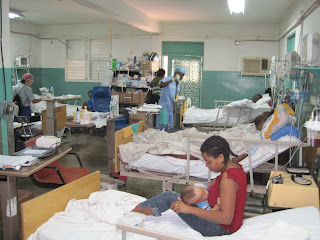


I'm not sure I know what normal is anymore. Sure, I've done statistics and know that in a poulation, you define the mean and standard deviation. 2 SD on either side is abnormal, even though many of these people in the 5% are not really different. In my practice back home, I've spent time, money, and created anxiety persuing "abnormal" results in normal patients. Sometimes we hurt them in the process. Since I've been here, my understanding of normal has been expanded. Healthy functional people have blood counts half of what we see in the western world. They respond to pain and other interventions differently. And it made me appreciate the extremely broad limits of human physiology and experience.
On my second day here, I operated on Mr. M, who had a bowel obstruction. I found a sigmoid cancer, a common condition in the states. The OR was filled by Haitian physicians and nurses who had never seen one. Normally, we would do an ostomy, but there are limited supplies, and patients with ostomies are ostracized. On the basis of advice from other surgeon who had worked here, I did a segmental resection and put the ends together. Mr. M stayed in our ICU (the equivalent of a medical floor elsewhere). Over time, he began to eat, have bowel movements, and was off antibiotics. His abdomen remained distended, but not tender. I obtained an X ray, which showed what appeared to be a massively dilated loop of bowel, suggestive of partial intermittent obstruction. His white blood count was normal, and yesterday morning, when I saw him, he was standing up, his wife bathing him. I was still uncomfortable and after consultation with another surgeon from Duke, felt we should reexplore him. It was a good thing we did. He had a massive pelvic abscess, and a leak. We washed him out, put in drains, and gave him a colostomy, recognizing he would stay in the hospital 8 weeks until it was closed.
Normally, you would give this type of patient large amounts of fluids, and keep him on a ventilator for several days. We had just found a ventilator when we worked through the supplies. Oxygen tanks were limited, but we all agreed to ventilate him overnight for the best chance of breathing normally. Fluids were restricted as long as he was making some urine. Oxygen was conserved to keep his saturations at 90%, rather than 100%. I was called at 230 am. The ventilator had failed. I went over, saw that he was awake, and realized we had little choice. I extubated him. In the States, after 10 liters of fluid, the patient would have not be able to breathe and would have died. Mr. M sailed. This morning he is up in a chair, asking for food. He's not out of the woods, but clearly has plans to stay around for a while.
In the compound, they are building a house for the hospital director. There are no backhoes, power equipment, or prefab trusses. Using axes, hand saws, wedges, and simple tools, they cleared the lot, dug out the stump, and cut the lumber on site. Unlike the situation we would be used to, there weren't 3 supervisors for every worker. Men helped each other out, and from what I could tell, took great pride in their work. This is normal for Milot.
Garrison Keillor, speaks wistfully of Lake Woebegone, where "all the children are above average." In my own life, despite many achievements, I have often wondered if how I felt or the decisions I made were normal. We ostracize others as abnormal and cast our own values to try to define societies and groups without a full appreciation of their experiences. By not trying to categorize things into normal or abnormal, I have become more open to basing decisions on what I realize is right or wrong, taking into account those around me. After Haiti,I will never look at outliers in the same way.
And remember the little girl with the large tumor? She was discharged yesterday. The postoperative course was normal.

No comments:
Post a Comment